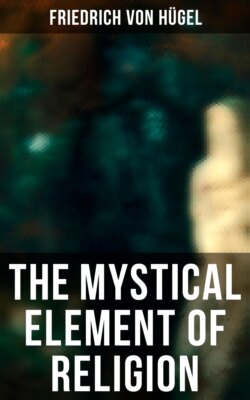Читать книгу The Mystical Element of Religion - Friedrich von Hügel - Страница 62
На сайте Литреса книга снята с продажи.
3. Such a conception not Epicurean.
ОглавлениеBut, in the last place, is not such a view of life Epicurean? Where is the Cross and Self-Renunciation? Is it not Christ Himself Who has bidden us cut off our right hand and pluck out our right eye, if they offend; Who has declared that he who hateth not his own father and mother for His sake is not worthy of Him; Who has asked, “What doth it profit a man, if he gain the whole world, and suffer the loss of his own soul?” and Who has pronounced a special woe upon the rich, and a special blessing upon the poor in spirit? Does not our view, on the contrary, bid a man attend to his hands and eyes, rather than to their possible or even actual offending, euphemistically described here as “friction”; bid him love his father and mother, even though this introduce a conflict into his affections; bid him take care to gain, as far as may be, the whole of his own possible interior and exterior world, as though this would of itself be equivalent to his saving his soul; and thus bid him become rich and full and complex, an aesthete rather than a man of God? In a word, is not our position a masked Paganism, a new Renaissance rather than the nobly stern old Christianity?
Now here again a true answer is found in a clear intelligence of the actual implications of the position. For if the Intellectual action were here taken as capable of alone, or in any degree directly, forming the foundation of all our other life, so that on a mathematically clear and complete system, appealing to and requiring the abstractive powers alone, would, later on, be built, according to our own further determination, the Institutional and Experimental, or both or neither; then such a position, if possible and actualized, would indeed save us the simultaneous energizing of our whole complex nature, and would, so far, well deserve the accusation of unduly facilitating life; it might be taken as, at least, not beginning with the Cross. But here this is not so. For from the first the External and the Mystical elements are held to be at least as necessary and operative as the Intellectual element; and it is impossible to see how the elimination of this latter, and of the ever-expensive keeping it and its rivals each at their own work, could deepen the truly moral sufferings and sacrifices of the soul’s life.
If again the Intellectual action were taken, as by Gnosticism of all sorts, as the eventual goal of the whole, so that the External and Mystical would end by being absorbed into the Intellectual, our Knowledge becoming coextensive with Reality itself, then we might again, and with still deeper truth, be accused of eliminating the element of effort and of sacrifice,—the Cross. But here, on the contrary, not only the Intellectual alone does not begin the soul’s life or build up its conditions, but the Intellectual alone does not conclude and crown it. Eternally will different soul-functions conjoin in a common work, eternally will God and the souls of our fellows be for us realities in diverse degrees outside and beyond of our own apprehension of them, and eternally shall we apprehend them differently and to a different degree by our intelligence, by our affection, and by our volition. Hence, even in eternity itself we can, without exceeding the limits of sober thinking and of psychological probability, find a field for the exercise by our souls of something corresponding to the joy and greatness of noble self-sacrifice here below. The loving soul will there, in the very home of love, give itself wholly to and be fulfilled by God, and yet the soul will possess an indefinitely heightened apprehension of the immense excess of this its love and act above its knowledge, and of God Himself above both. And here again it is impossible to see how the elimination of the intellectual element, which becomes thus the very measure of the soul’s own limitations, and of the exceeding greatness of its love and of its Lover, would make the conception more efficaciously humbling and Christian.
Both at the beginning, then, and throughout, and even at the end of the soul’s life, the intellectual element is necessary, and this above all for the planting fully and finally, in the very depths of the personality, the Cross, the sole means to the soul’s true Incoronation.
